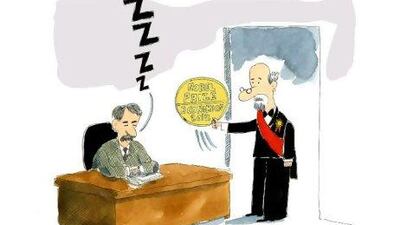OK. I'm confused. Or is it offended?
The world is sitting on a fiscal cliff - and has been since the autumn of 2008 - and yet the Royal Swedish Academy of Sciences continues to dole out its Sveriges Riksbank Prize in Economic Sciences in Memory of Alfred Nobel, better known to you and me as the Nobel Prize for economics (although, apparently, it's not really a Nobel Prize).
So the news that two American economists, Alvin Roth and Lloyd Shapley, this week won the coveted prize for economics is a surprise.
Not that they won it (OK; that, too), but because the Royal Swedish Academy of Sciences actually went ahead with it.
I mean, honestly, can you think of any economist in this world who actually deserves to win a Nobel Prize at the moment? Or for the past four years for that matter?
I certainly can't.
The global financial system is a train wreck and every economist and banking expert supposedly working on its repair has failed to come up with a solution to fix it, which would allow us to finally move on from the worst economic crisis since the Depression.
Instead, the Royal Swedish Academy of Sciences continues to reward economists every year for their (usually obscure) work that has nothing to do with fixing the economic crisis.
Case in point? This year's winners picked up their gongs for a market-matching theory that could, for instance, lead to life-saving kidney exchanges, ways for schools to better select students or men and women to find life partners.
Yep. Now there's a theory that's really going to get us out of this mess (not).
Although that's not to say that life-saving kidney exchanges are not important - more so if one of the people it saves has a light-bulb moment and comes up with a realistic plan to get the world's finances back on track.
In return for their efforts, the Nobel winners receive a handy cash fillip of US$1.12 million (Dh4.11m) and an invite to a lovely awards ceremony at Stockholm's concert hall, followed by a lavish banquet at the nearby city hall.
Not quite the Oscars, but it is the night of nights for the world's boffins to slap each other on the back and congratulate themselves for a job well done in trying to make a difference. Except for, of course, the economists - because they have yet to make a difference to our financial woes.
But back to my soapbox.
What if, say, the Nobel committee went out on a limb and cancelled its economic prize this year on the grounds that no economist had figured out how to put an end to the crisis and, therefore, didn't deserve it?
And what if it decided to donate the prize money to a worthy cause - a global financial literacy programme would be a good start - instead of giving it to two men who worked out how dating sites can better boost their profits and schools can lift their performance (and, no doubt, fees along with it)?
A decision like that, I imagine, would be applauded by the world's 99 percenters - those Mr and Mrs Averages who have paid dearly for the greed of the world's banks and their risky, complicated bets.
The Royal Swedish Academy of Sciences begs to differ. It said the work of Mr Roth and Mr Shapley was "an outstanding example of economic engineering".
I'm sure Mr Roth and Mr Shapley have worked hard on their theory. But perhaps they'd be more deserving of a Nobel in another decade; one in which the creeping black shadow of massive sovereign debt is no more and global unemployment isn't at record highs.
But in a world where suicides have risen in many countries because people can't cope with the financial strain of sitting on the edge of that fiscal cliff we are teetering on, it is hard to celebrate - or even welcome - the award this year.
Instead, I'm going to pretend it doesn't exist (at least this year) and award my own Nobel Prize for economics - except I'm going to call it the Glover prize for economics. It doesn't quite have the same ring to it (nor, unfortunately, that $1.12m prize), but still, it comes from the heart. Drum roll, please.
It gives me great pleasure to announce that the 2012 Glover award for economics goes to ... the 99 percenters, for their "outstanding example of creative economic engineering" and learning the hard way about living beyond their means.
It's been a long time coming, but congratulations - you deserve it.


